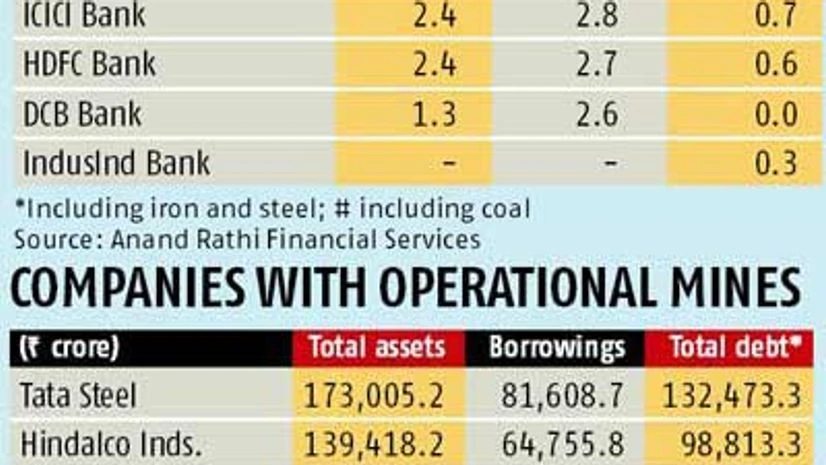For banks, the cancellation of 214 coal blocks on Wednesday is a major worry. Of the metals, mining and power companies whose coal blocks have been cancelled, the top 11 (in terms of borrowings) together owe lenders about Rs 2.7 lakh crore.
Together with non-borrowing liabilities such as deferred taxes, the overall liabilities of these companies stood at Rs 4.13 lakh crore at the end of March this year. In all, Rs 5.7 lakh crore of lenders' and shareholders' capital was locked in these companies at the end of March, according to figures from Capitaline.
On Wednesday, the BSE Bankex declined one per cent, led by a sell-off in public sector banks such as Bank of India (down 5.6 per cent), Canara Bank (down five per cent) and Punjab National Bank (down 4.3 per cent).
Among individual companies, bankers will be the most worried about Jindal Steel and Power Ltd (JSPL), JSW Steel, Hindalco, Jaiprakash Power Ventures and Tata Steel. At the end of March this year, JSPL had Rs 50,700 crore of debt, including bank borrowings of about Rs 32,000 crore.
Among mid-sized companies, those such as CESC (debt of about around Rs 12,000 crore at the end of March this year), Monnet Ispat (Rs 8,100 crore) and Usha Martin (Rs 6,900 crore) are the biggest worries for lenders.
According to a study by Enam Securities, coal accounts for about half the total assets of the mining sector. In all, banks have exposure of about Rs 37,000 crore to the mining sector, or 0.6 per cent of their system-wide credit. "While this figure on mines seems low, the impact could be much greater, as it will impact power plants dependent on these mines," Enam Securities said, reacting to today's court judgment.
It is likely infrastructure non-banking financial companies such as Power Finance Corp, Rural Electrification Corp and DFC, which have high exposure to private entities involved in the mining sector, will be impacted more than banks.
Among banks, Punjab National Bank has the highest exposure (2.6 per cent of total advances, including non-fund based) to the mining sector, while Canara Bank's exposure to the energy sector is the highest (12.6 per cent).
According to brokerage firm Anand Rathi Financial Services, the Supreme Court order will hit Andhra Bank the hardest, as the power sector accounts for 13.4 per cent of its total industry loan book, followed by UCO Bank (13.1 per cent) and Corporation Bank (11.9 per cent). Private banks have the least exposure to this sector, with ICICI Bank (2.4 per cent), HDFC Bank (2.4 per cent) and DCB Bank (1.3 per cent) at the bottom of the list.
State Bank of India Chairperson Arundhati Bhattacharya said, "We believe uncertainty is possibly the worst enemy of growth. We are glad this is over, with the Supreme Court verdict on coal blocks allocation. Now, we look forward to a quick plan of action for ensuring coal supplies aren't disrupted and, thereafter, a swift and transparent bidding process for reallocation." At the end of June this year, the bank's fund-based exposure to the coal sector was Rs 2,916 crore, the iron & steel space Rs 1,09,053 crore and the power segment Rs 94,902 crore.
A Punjab National Bank official said the bank was assessing the implications of Wednesday's judgment. Its fund-based exposure to the coal segment was Rs 1,011 crore, as of June. Exposure to the power sector was Rs 33,873 crore, while that to the steel sector was Rs 22,213 crore.
IDBI Bank Deputy Managing Director B K Batra said his bank had exposure to four power projects, which might be impacted by the court verdict. Its total exposure to this segment- term loans and working capital - was about Rs 2,000 crore.
Another worry for banks is the Rs 295/tonne fine imposed by the apex court on the mines already operational. Senior public sector bankers say miners might pass this to the power producers sourcing coal from these mines. There will be an adverse impact for generators in case the power purchase agreements do not allow cost pass-through. In such cases, the power company's ability to service loans will be under pressure, leading to defaults in extreme cases.

)
